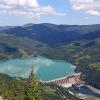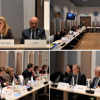News
Displaying Results 1 - 25 of 34
Originally introduced in policy and development discussions in 2011, the water-food-energy-ecosystem nexus approach has evolved into a pivotal framework for sustainable development and achieving the Sustainable Development Goals (SDGs).
Work on the water-energy-food-ecosystems nexus under the…
Integrated management of water, energy and land resources, while protecting ecosystems, remains a substantial challenge in the Western Balkans. The Water-Food-Energy-Ecosystems (WEFE) Nexus approach offers solutions that can reconcile potentially conflicting interests as they compete for the same…
Energy and water resources are integrally related and strongly interdependent. Facilitating their integrated management and monitoring can therefore offer an important foundation for sustainable development. The United Nations Framework Classification of Resources (UNFC), developed at UNECE, can…
In the Drina River Basin, shared mainly by Bosnia and Herzegovina, Montenegro and Serbia, working together across borders and jointly addressing water and energy challenges is a key part of effective climate action and the green transition.
As part of the Sarajevo Energy and Climate Week (25-29…
Capitalizing on countries’ renewable energy potential requires bringing together different actors and interests in order to overcome barriers and identify priority actions.Responding to this need, “New Possibilities for Developing Renewable Energy Sustainably in Serbia” was the focus of the 6th…
COP26 was a positive step forward in the fight against climate change, but as the UN Secretary General pointed out in his comments: “it is not enough. We must accelerate climate action to keep alive the goal of limiting the global temperature rise to 1.5 degrees.” The compromise deal reflects the…
How to develop projects, initiatives and ideas to build resilient energy systems in Central Asia? This was the focus of the 2nd Almaty Energy Forum, held from 14-16 November at the Kazakh-British Technical University. The Forum, a joint effort of four UN organizations – Economic Commission for…
While underground coal mining in Albania stopped almost wholly (except for two private mines with a very insignificant output) more than 15 years ago, the abandonment of the mines from the 1990s onwards with no proper plans for closure has left a legacy of risks. These include water contamination,…
Representatives from Kazakhstan, Kyrgyzstan, Tajikistan, and Uzbekistan met at the United Nations Economic Commission for Europe (UNECE) to discuss ways to unlock the resource potential and promote a sustainable future in Central Asia. The meeting was part of the UNECE Resource Management Week 2023…
As the sun sets in northern México, less than 100 kilometres from its border with the United States, news from the latest coal mining disaster near Sabinas, in the state of Coahuila, is heartbreaking for the families awaiting at the surface. Military divers who have bravely attempted to make their…
Twenty-one government officials, project developers and experts from 13 countries of South-Eastern and Eastern Europe, Caucasus, and Central Asia participated in The Inter-regional Workshop and Study Tour Energy Efficiency and Renewable Energy Projects and Policies in Israel. The event, held…
The Asia-Pacific region is home to some of the world's largest and most diverse reserves of minerals, energy, water, and biomass. The region accounts for around 70% of global mining production and consumption, including most of the world's bauxite, copper, iron, nickel, silver, tin, and zinc. …
Countries choose different pathways to meet commitments they have made under the 2030 Agenda and the Paris Climate Agreement, as national circumstances vary significantly. Analysis of the progress to date shows that much greater effort is needed, including much bolder policy commitments,…
Improving energy efficiency is a cost-effective means to support economic development while contributing to climate action. On a national scale, energy efficiency helps strengthen energy security, reduce energy expenditure, slow down energy demand growth, reduce investment needs for new generation…
Addressing the Tashkent International Investment Forum (2-3 May 2024), UNECE Executive Secretary Tatiana Molcean called for the mobilization of private sector investments to support the implementation of the Sustainable Development Goals (SDGs) and to foster regional cooperation in Central Asia.…
At the World Economic Forum Annual Meeting in Davos, UNECE Executive Secretary Tatiana Molcean highlighted the role of UNECE’s legal instruments, standards and tools in dealing with the most pressing global challenges, namely climate change, digital and green transformations, low-carbon energy…
Global goals – just like regional and national goals — can only be achieved if we work together. This is a reason that revitalizing partnerships is at the heart of the Sustainable Development Goals (SDGs).
With this in mind, under the umbrella of the Regional Collaborative Platform, regional…
UNECE led a coalition of international experts to train raw material experts in sustainable resource management.
COP26 added much needed impetus towards climate action. Raw materials will be a pivotal part of the conversation in driving innovation in a regional circular economy including recycling…
Profits matter in any industry but prioritizing short-term financial gains at the expense of longer-term considerations – which must also address social and environmental aspects – cannot be an enduring business model. Raising objectives in terms of social and environmental outcomes can…
Sustainable development must be underpinned by sustainable energy systems. In Azerbaijan, the government has adopted the increased use of renewable energy sources as a priority area for the country. To support this objective, Azerbaijan is planning for the installation of stations designed…
The 2030 Agenda for Sustainable Development requires countries to pursue concerted and accelerated action on energy in their national programmes. In order to understand the full implications of the development imperatives, countries need to apprehend what has been agreed both in their own…
Combined with electricity from renewable sources, hydrogen has the potential to replace hydrocarbons in the UNECE region by 2050. Hydrogen can be used in transport, homes, industry, and power generation as part of an integrated service-based society.Hydrogen has been produced and used in huge…
The world is not on track to meet the target of the Paris Agreement to limit global warming to 'well below' 2°C. Participants at the Ninth International Forum of Energy for Sustainable Development (12-15 November 2018) in Kiev, Ukraine, deliberated on how nuclear energy could contribute to deep…
Cuba is considering the United Nations Framework Classification for Fossil Energy and Mineral Reserves and Resources (UNFC) as a national resource management tool. UNFC enables consideration of economic benefits as well as environmental and social advantages when applied as a resource reporting…
Building resilient energy systems to address the ongoing global energy crisis will be top of the agenda of the upcoming Sustainable Energy Week (19-23 September). Representatives from UNECE's 56 member States will discuss how to ensure energy for optimal social, economic, and environmental…
















